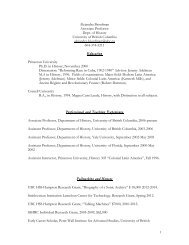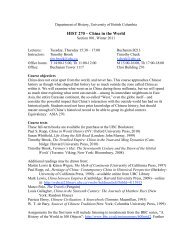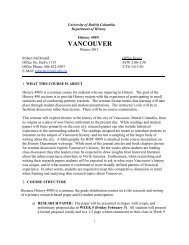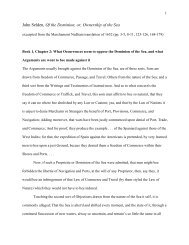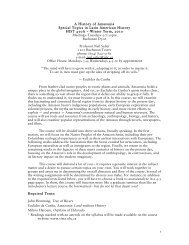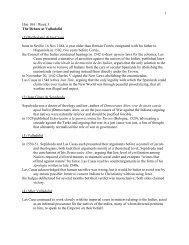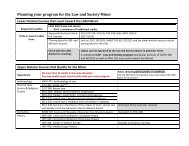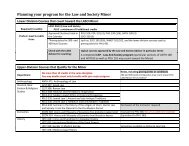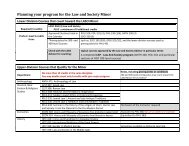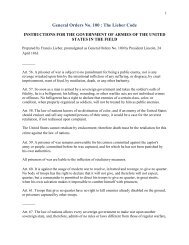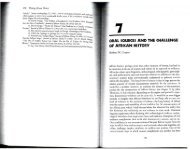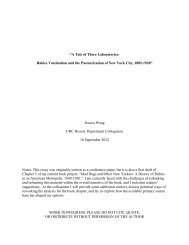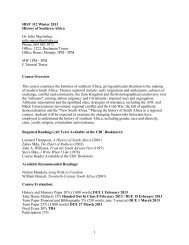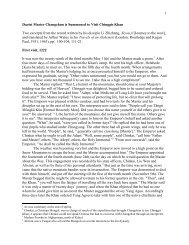Orientalizing the Pacific Rim: - History, Department of
Orientalizing the Pacific Rim: - History, Department of
Orientalizing the Pacific Rim: - History, Department of
You also want an ePaper? Increase the reach of your titles
YUMPU automatically turns print PDFs into web optimized ePapers that Google loves.
could speak Chinese and Japanese and <strong>the</strong> sociologists could not, <strong>the</strong> researchers had to<br />
rely upon <strong>the</strong> church network for translation and interpretation. The need for ‘native’<br />
translators and informants was acute. The social scientists quickly turned to ‘Oriental’<br />
students in <strong>the</strong>ir classes, and by <strong>the</strong> end <strong>of</strong> <strong>the</strong> survey a spate <strong>of</strong> student <strong>the</strong>ses and<br />
papers concerning <strong>the</strong> ‘Oriental problem’ had been written in every major university<br />
on <strong>the</strong> West Coast. 40<br />
The Survey <strong>of</strong> Race Relations was <strong>the</strong> first major intersection between American<br />
missionary efforts among 'Orientals' and American sociology’s research interests with<br />
‘Oriental’ immigrants. The fascination <strong>of</strong> <strong>the</strong> Protestant ministers in ‘Orientals’ such as<br />
Flora Belle Jan--American-born, ‘enlightened,’ and modern--was to overlap with <strong>the</strong><br />
sociologists’ interest in <strong>the</strong> Americanization and cultural assimilation <strong>of</strong> ‘Orientals.' In a<br />
modern world <strong>of</strong> movement and migration, <strong>the</strong> missionaries believed that <strong>the</strong>y served<br />
as expert travellers whose knowledge <strong>of</strong> 'Orientals' abroad provided <strong>the</strong>m with<br />
expertise about 'Orientals' at home. In a related way, <strong>the</strong> sociologists believed that <strong>the</strong>ir<br />
knowledge <strong>of</strong> 'Orientals' in America told <strong>the</strong>m something about 'Orientals' in Asia. This<br />
effectively cut <strong>of</strong>f for decades already). Because <strong>the</strong> Philipines were under <strong>the</strong> control <strong>of</strong><br />
<strong>the</strong> United States, Filipinos could move much more freely between <strong>the</strong> Philipines,<br />
Hawaii, and <strong>the</strong> mainland United States than foreign nationals, and <strong>the</strong>y became a<br />
major labor source to replace <strong>the</strong> supplies <strong>of</strong> o<strong>the</strong>r Asian workers cut <strong>of</strong>f by<br />
exclusionary acts. East Indian migrants tended to stay in dominions <strong>of</strong> <strong>the</strong> British<br />
Empire such as Hong Kong, Australia, and Canada.<br />
40 For <strong>the</strong> impact <strong>of</strong> Orientalist <strong>the</strong>ories on <strong>the</strong> self-identities <strong>of</strong> Chinese and Japanese<br />
American intellectuals, see “The ‘Oriental Problem’ in America: Linking <strong>the</strong> Identities<br />
<strong>of</strong> Chinese and Japanese American Intellectuals," in Claiming America: Constructing<br />
Chinese American Identities During <strong>the</strong> Exclusion Era, edited by K. Scott Wong<br />
(Philadelphia: Temple University Press, forthcoming).<br />
28



